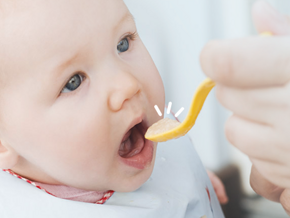
Your 6 to 12 Month Old’s Hunger & Fullness Cues
Is your hungry baby eating enough? Here are some hunger and fullness cues to watch out for in babies sitting up.
From 6 to 7 months
Knowing when to feed
At this stage, your baby’s menu may have expanded to include more infant cereals and baby food varieties. Your little one’s excitement over food can turn mealtime into a fun, playful experience for the both of you. Take advantage of it.
Hunger signs
- Still cries or fusses when hungry for milk or desires food.
- Reaches for spoonfuls of food.
- Opens mouth and leans in toward bowl or spoon.
- Stares at you while eating as if to say “I’m not done yet.”
Knowing when they're full
Whether breast, bottle or spoon-feeding, your baby makes their wishes known when they're full.
Fullness signs
- Turns their head from the nipple, if it’s breast or bottle.
- Leans away from the food and may push the spoon away.
- Clenches their mouth shut and doesn’t allow you to feed them.
- Spits out food that they like.
- Pushes away the bowl or whatever food is there.
- Slows down the pace, gets distracted and looks elsewhere.
- Falls asleep while feeding.
From 8 to 12 months
Knowing when to feed
It’s important to recognise hunger and fullness cues because a baby’s tummy is small. Although your baby’s portions may seem tiny, they eat less, but more frequently than you do. You are learning their cues for hunger and fullness, and your baby is learning how to respond to your behaviour.
Hunger signs
- Kicking their legs and banging on the high chair tray says “Hurry up with the food, Mum.”
- Putting fingers in their mouth and fussing, which lets you know they may be hungry.
- Carefully watches as you prepare the food, and is excited when you present it.
- Reaches for food when they see it says “time to eat.”
- Eats with full attention on you and anticipates the next bite.
Knowing when they're full
Your baby usually makes their wishes known when they're full.
Fullness signs
- Turns their head or leans away from the spoon.
- Shuts their mouth tight and shakes their head “no” when they've had enough.
- Pushes away their bowl and tries to knock the spoon from your hand.
- No longer appears interested in eating and looks away from you.



















